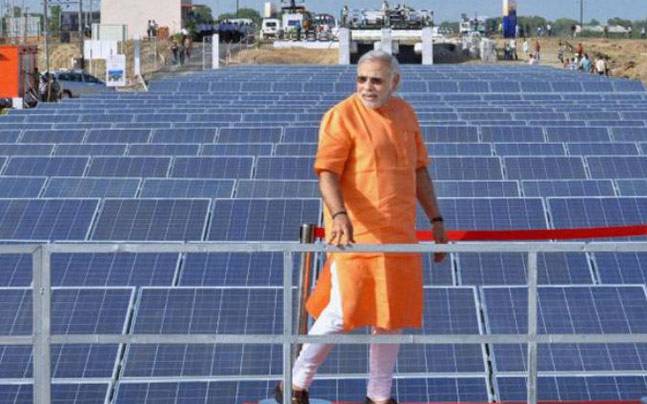International Solar Alliance, an international organization led by PM Modi consists of more than 121 countries, has gained currency in last few months. UN secretary general conferred the highest environmental honor, the UNEP Champion of the Earth award to PM Modi a few days back. “Prime Minister Modi has been selected in the leadership category for his pioneering work in championing the International Solar Alliance and for his unprecedented pledge to eliminate all single-use plastic in India by 2022,” said UN Secretary-General Antonio Guterres in the ceremony at Pravasi Bharatiya Kendra.
International Solar Alliance (ISA) was proposed by PM Modi in November 2015 at Wembley Stadium. The alliance was first proposed for sunshine countries, which lie either completely or partly between the Tropic of Cancer and the Tropic of Capricorn. PM referred to these countries as Suryaputra (Sons of the Sun). Now, the alliance is open to all the UN member countries.
India played important role in establishment of ISA and in many ways leads the multinational alliance. It is first international alliance which will have its secretariat in India and an Indian, Upendra Tripathy will lead the alliance. “India will produce 175 GW electricity from renewable sources by 2022 and 100 GW will be from solar energy,” Mr. Modi said, while addressing the ISA. “Distribution of 28 crore LED bulbs in three years has saved $2 billion and 4 GW of electricity. India will also provide 500 training slots for ISA member-countries and start a solar tech mission to lead R&D,” he added.
India seeks to use ISA both as foreign policy tool and clean energy driver. On the energy front, ISA will be counter to Vienna-based Organization of the Petroleum Exporting Countries (Opec) and Paris-based International Energy Agency (IEA). On foreign policy front, ISA will be a counter to China’s ambitious One Belt One Road (OBOR) initiative through which the dragon aims to dominate Asia. Modi pitched for “one-world, one-sun, one-grid”, to project ISA as a tool for the good across the globe. ISA is arguably the largest international alliance since Non-Aligned Movement (NAM) in which India is the founding member and leader.
Modi stressed on the role ISA could play in future in the field of clean energy. “The ISA will have same role in future what is being currently being played by OPEC. The role of the oil wells today will be that of the sun’s rays tomorrow,” said PM Modi. OPEC is an alliance of 15 countries which produce almost half of world’s crude oil. Therefore these countries manipulate the oil prices in international market by reduction/increase in the production of crude oil. On the other hand consumer nations like India, China has no ‘collective bargaining’ power against OPEC. These countries despite being among the largest consumers have to pay ‘Asia Premium’ to OPEC countries.
The production and consumption of renewable energy is growing exponentially in the country. Recently, Power Minister R K Singh said that he has revised the target of renewable energy capacity addition from 175GW to 227GW by 2022. Globally, India stands 4th in wind power, 5th in renewable power and 6th in solar power installed capacity. Solar energy capacity has increased by 8 times from 2.63 GW in 2014 to 22 GW. Wind energy capacity increased by 1.6 times from 21 GW in 2014 to 34 GW. “By 2030, 40% of our electricity will be non-fossil fuel based. India has emerged as the most favorable destination for renewable energy with around $42 billion been invested in the country, over the next four years, the green energy sector has a business potential of around $70-$80 billion,” said Modi during the inauguration of 1st Assembly of International Alliance (ISA) at Vigyan Bhavan in New Delhi.
ISA will help India to lead the future of energy as well as augment its bargaining power against organizations like OPEC. The price of solar energy has gone down is last four years with growth in investment. If India successfully leaps to clean energy in the upcoming decades, a huge amount of foreign exchange spent on oil bills could be saved. Therefore, India’s future in clean energy will depend on ISA’s success to a large extent. In addition, ISA could be an effective foreign policy tool to enhance and expand India’s soft power.
